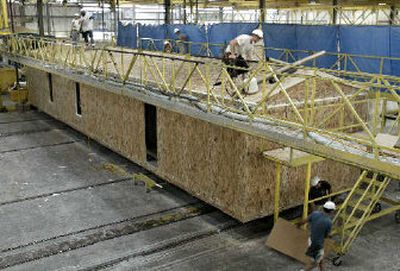For now, they’re immobile homes

WHITE PINE, Tenn. — Manufacturers are gearing up to produce cities of mobile homes for Hurricane Katrina victims, but 10 days after the federal government received their proposals to address the housing emergency, the companies are still waiting for a response.
“A lot of people are waiting,” said Phyllis Knight, executive vice president and chief financial officer for Champion Enterprises Inc., a mobile home manufacturer based in Auburn Hills, Mich.
The Federal Emergency Management Agency set a Sept. 9 deadline for mobile home makers to submit bids. But FEMA spokesman Butch Kinerney said there has been a delay because the agency’s parent, the Department of Homeland Security, has yet to approve a housing plan.
“We want to be good stewards of taxpayer dollars,” he said on Friday. “I know they (manufacturers) are standing by and getting a little frustrated. We want to make sure we are spending the money the right way. It doesn’t mean people are going to go without.”
He said the manufacturers would get responses to the bids early this week. As of Monday, bidders still waiting for a response included the largest manufacturer of mobile homes, Clayton Homes Inc., based in Maryville, Tenn.; and Riverside, Calif.-based Fleetwood Enterprises Inc.
Knight said there was a discussion with FEMA over the weekend, but the agency’s slow response was delaying production, although she predicted the lost time could be made up.
FEMA spokeswoman Nicol Andrews said Monday the agency was “awarding contracts as quickly as possible.” She did not have a specific timetable for the bid responses or details on how many were being ordered.
Soon after the hurricane struck, FEMA officials said they ordered 125,000 mobile homes and travel trailers in a rush, and manufacturers starting shipping off those they had already made.
“We’ve got plenty of housing units on the road, in the pipeline right now, but we are going to need more,” Kinerney said in a Friday telephone interview from Washington.
But manufacturers say they’re still waiting to hear whether they should move ahead with production of those homes.
Clayton, the nation’s largest manufacturer, said it rounded up 1,800 from retail lots across the country and sent them to a staging area in Texarkana, Texas.
Producing enough to accommodate the masses of Katrina refugees is a daunting task for a mobile home industry currently building about 135,000 units a year.
FEMA estimates 200,000 households have been displaced by Katrina — far more than the 15,000 households that needed shelter last year after the Florida hurricanes.
With the mobile home industry struggling for several years, mainly from customer lending problems that have seen production drop from more than 400,000 units a year, a spokesman said it was too early to predict the impact of Katrina.
“It’s an opportunity for the industry to show it can build quality houses at affordable costs,” said Thayer Long of the Manufactured Housing Institute in Arlington, Va.
Clayton spokesman Chris Nicely said his company bid to provide 3,000 more homes. He declined to give specifics on bid pricing.
The company’s models typically cost from about $25,000 to $35,000 each. Clayton makes 500 to 650 mobile homes a week and could immediately boost production by another 300, Nicely said.